#monogatari meta
Explore tagged Tumblr posts
Text
Thinking about Meme Oshino, and his philosophy that people can't save others, that they can only save themselves. I have mixed feelings about it overall. On one hand, I am sympathetic to the idea that a person can't be helped if they insist on being unchanging, and I would even agree that there's no point relying on being saved by others, because you can't control them, only yourself. But that doesn't mean that I think it is impossible to help others or be helped, there are plenty of situations where it's just self evident that having help from the people around you makes difficult situations more bearable. So why is Meme like this?
I think Meme is meant to foil Koyomi in this case. Koyomi starts the series in Kizu self-isolating out of depression, but it is not something that brings him happiness, or a way he really wants to live. Meme in Bake is the opposite of this, kind of an example of the type of person who really is fine in complete isolation, relying on nobody, being relied on by nobody, moving from place to place the moment he thinks he might be laying down real roots. And he's meant to be impressive, I think, the larger than life figure fully confident in the situation, who understands and can deal with oddities while our main characters don't fully understand and feel lost without his guidance; he really is someone with maximum "power as a human."
But his whole outlook shows what is required to live like that in truth, as more than a side effect of self-loathing and something you apply selectively to yourself. If you really believed that standing alone was the natural state of being, that people's happiness and suffering was ultimately caused by their own actions, then yeah, the logical extension of that is blaming a child for being abused, or saying teenagers are at fault for being depressed.
And even with all this he's not a bad person. He goes out of his way to assist the cast and presumably other random offscreen people as he meets them, he doesn't ever try to harm others (except, perhaps, Kiss-Shot in Kizu, but like. Super Vampire is extenuating circumstances). He's not some social darwinist saying people need to be alone and only the strongest deserve happiness, he really is a good guy, but he sees people as fundamentally alone. There's a saying that goes something like "nobody is an island," but Meme is the counterexample who shows what that island would look like, in it's most positive form. And it's not someone Koyomi can ever really be.
75 notes
·
View notes
Text
"Unanswered" Prayers in Tearmoon Empire
(Light Novel/Potential Web Novel Spoiler Warning here)
This had been on the back burner for some time while I was reading through the chapters, but the more I went into the story, the more I saw characters express their longings and laments of regret as "prayers," especially when it came to them in the Guillotine Timeline. And with these prayers, they tend to be answered in the current timeline Mia is making as she (somewhat unwillingly) sets on to becoming the future Empress.
A somewhat isolated case of what I want to talk about can be seen from the side chapter in Volume 4 involving the Perujin princess Arshia.

Arshia, who had seen the horrors of famine, had once prayed to find a way to solve the issue, but over time had thought it was left unanswered, and sought to solve the matter through her hard work and research. Mia wanted to seek her to be an educator for the new academy she was setting up because of her knowledge of botany, but due to past mistreatment and discrimination from other Tearmoon nobles, she refused the offer. In a dinner Mia set up that was meant to make those nobles apologize to her (which failed), was only after meeting the future students of the academy and overthinking Mia's intentions that Arshia's prayer started to come back to her. Through accepting the teaching position, she became a key figure in creating the cold-resistant wheat alongside Cyril Rudolvon.

Additionally, in the web novel site where Tearmoon's story originally is published, the author reveals in a sidenote that he based this chapter on a missionary telling him the parable of the drowning man:
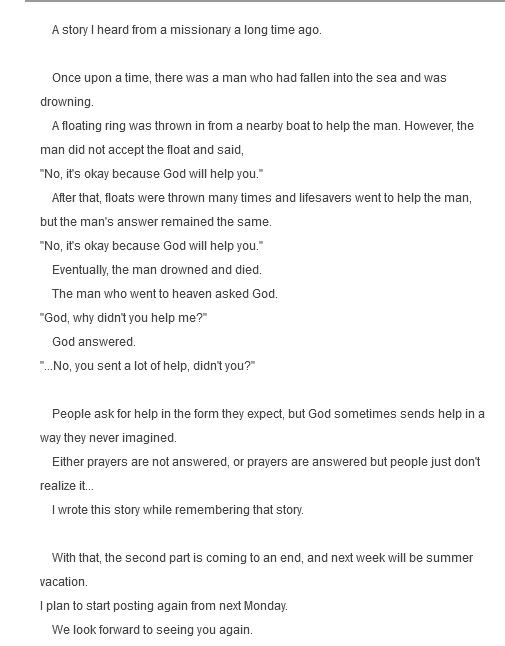
Now, going back to the bigger plot of Tearmoon, by Volume 12, we're starting to get confirmation that Mia being sent back in time (and by extension Miabel and Patricia going to her point in time) is because God/the Holy Deity (as how He's written within the story) willed it to happen. So how does that tie in to "unanswered" prayers?
First, we get Anne's prayer in Volume 1 as Mia is about to be executed:

(WEB NOVEL SPOILERS: In a chapter still unreached by the light novel publication, Mia looks back to this moment, and even thinks that Anne's prayer of protection was where her turn-back in time had started.)
In Volume 4, we see Ludwig beginning to see the "dreams" of the Guillotine Timeline and his prayer for Mia back then:

It should be noted that from Ludwig developing the theory of Miabel's time travel in Volume 12, he has now gotten a better picture on the situation, and may have recalled his prayer from back then.
In Volume 9, we get a look of Mia's prayer of redemption from the Guillotine Timeline as she deliberates her decision on Echard's punlshment:

TL;DR: The whole plot of Tearmoon Empire hinges on God answering prayers in unexpected ways
#Tearmoon Empire#Tearmoon Teikoku Monogatari#Christianity#Salt and Light#Meta#Mia Luna Tearmoon#Anne Littstein#Ludwig Hewitt#Arshia Tafrif Perujin#Spoilers#Light Novel Spoilers#God#Prayer
31 notes
·
View notes
Text
Touken Ranbu: The Contradictory Tale of Genji
Part 3/3 - Overall Impressions:
On a technical level, the show is quality. The main cast sang melodiously and music composition was suitable to the time period and mood of the show. There was not so much dancing to judge but acting was superb. Many actors had to play double roles such as anyone possessed by Genji or anyone on the Genji side of the plot. The contrast was evident and well-done. The child actor was very professional and I had no issue with her when I’m usually not impressed. That was a pleasant surprise. Set design was minimalist, which made for some creative setups but there were enough hints for the audience to suspend disbelief and jog their imagination. The transitions were incredibly fast and most of it was done using a giant cloth sheet that represented a page of the novel that was waved about.
Of course, I loved the costumes. Combined with the actors, they effectively brought the characters to life. Ladies and lead role Nanami Hiroki got the best picks. Akira got an epic evil costume in the end to represent Genji going rogue. It was a chaotic costume by design with mostly Japanese silhouette but what’s with the Chinese style double skirt, armor design, and hairdo? (jkjk lol) I suppose turning evil turns you into a jumbled mess of modern art. The real moral here is treat your fictional world with care or risk it biting you back.
Now this is a sword show so naturally the fight choreography was incredibly smooth and stylistic while being cleanly executed. Genji is no swordsman but a scholarly prince so his weapon was a fan that Akira wielded gracefully and skillfully in her fast-paced battles. In fact, there was a lot of fan twirling and all done to perfection. My praise is for the effortless ease actors were wielding fans. I would expect them not to drop them as part of the job.
The overarching theme concerning the value of fiction was compelling. When the creeper fan confronts Murasaki and later curses all of Kyoto, the five precepts of Buddhism is referenced. Among these precepts is the prohibition against speaking lies or falsehoods, which encompasses anything ranging from thoughtless remarks to “great fictions.” The fan praises the book but is worried that spreading of such an influential fictional work will result in leading people astray and thus Murasaki would be punished in the afterlife for her sins. In fact, in medieval history a memorial service was held to rescue Murasaki’s spirit from Buddhist hell over this very matter. One can take the traditional Buddhist interpretation of life being hell because life is suffering and impose it over the musical. Therefore, the isekai is a type of trial. Just as the Empress and other readers of The Tale of Genji are grappling with their reality through the novel, they are reliving the parts of the book they resonate with to find a solution to the problem in their lives. An even darker interpretation is the ghosts of Heian-kyo are in purgatory by living in the fiction they became consumed with instead of being present in society. During Murasaki’s time, the upper echelons of society were obsessed with the Cult of Beauty at the cost of governance and economy so was quite corrupt and detached from reality. What more fitting punishment in the afterlife than eternity in their vapid world? Perhaps the touken danshi stumbled upon such a purgatory.
There is also more contemporary views of fiction in this play. Murasaki pushes back in the debate by respecting the intelligence of her fans and expressing the love she has for her writing and its very real value to herself. Furthermore, her avid readership stand in solidarity by citing the novel’s beauty and meaning to their lives either as escapism or example. Here we see more modern values on display with fiction enriching and enhancing reality or supporting readers through their struggles and triumphs. One can also glean commentary about parasocial relationships as well with Murasaki’s interactions with her fanbase and the fans’ earnest love of a fictional character. In short, this is a story about the influence and impact of stories on people and how wonderfully weird and beautiful that relationship is.
The story I enjoyed a lot. Many videogame and anime musicals are shallow cash-grabs but this one went out to tell a meaningful story. I respect that. I’m even tempted to buy the DVD lol. Not like there’s any merch left anyways. All that sold out before the curtains even rose.
#takarazuka og#og lyfe#takarazuka#nanami hiroki#kai#seto kazuya#akira#ayanagi shou#otokoyaku#theatre#theater#touken ranbu#touken ranbu musical#my meta#my rambles#my ramblings#my thoughts#genji monogatari#tale of genji#宝塚OG#宝塚#源氏物語#刀剣乱舞#七海ひろき#瀬戸かずや
18 notes
·
View notes
Text
#sunakawa makoto#ore monogatari#when they get married they invite him on the honeymoon#hes like hm. i feel like i shouldnt be a part of this.#hes invited into the delivery room when their kids are born#they live as next door neighbors as adults until yamato is like 'wouldnt we save money if we all got a house together?'#their family graves are next to each other#etc etc (X)
"Guy who's a member of a polycule but he's not dating anyone he's just there" sunakawa makoto
192 notes
·
View notes
Text

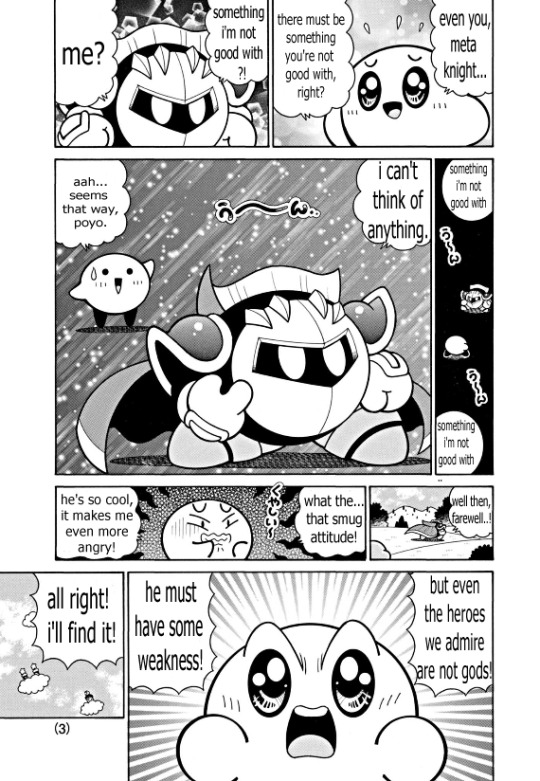
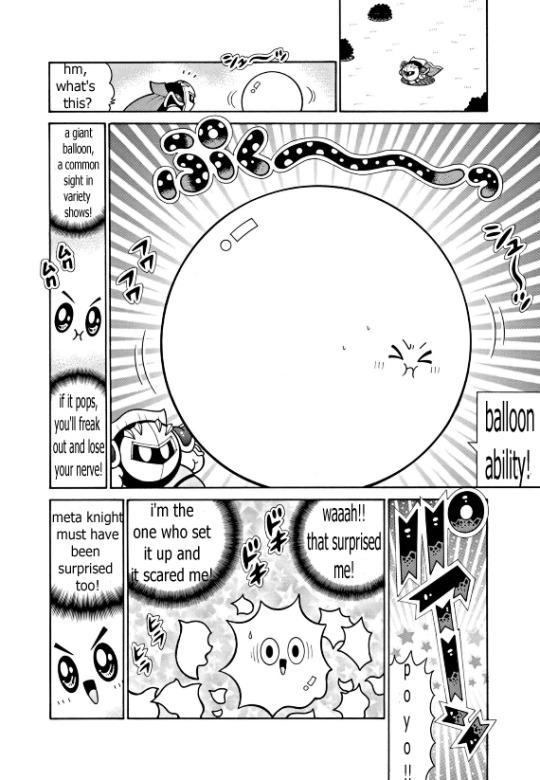

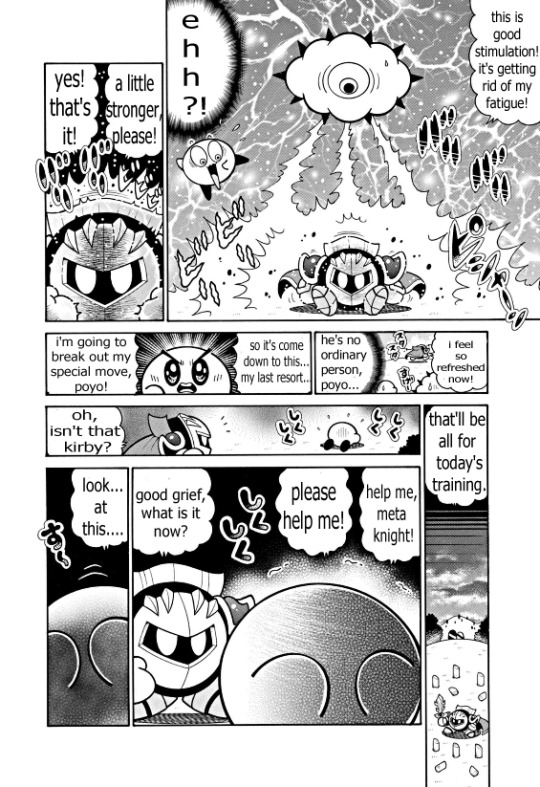
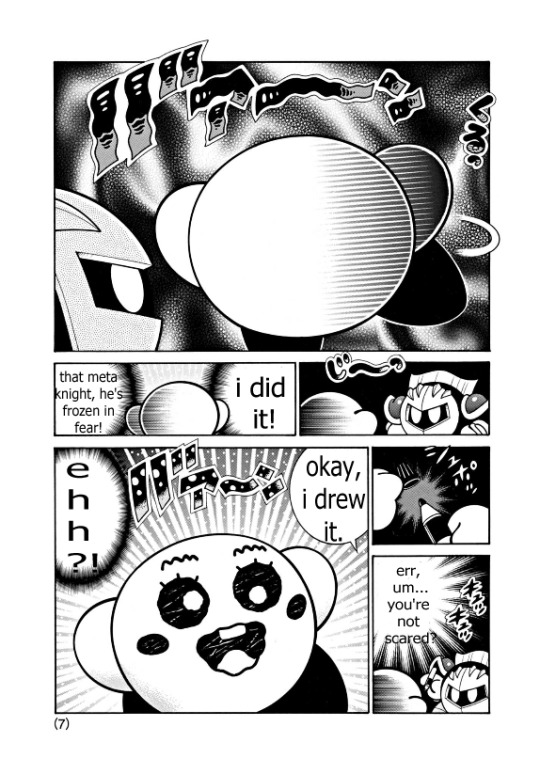
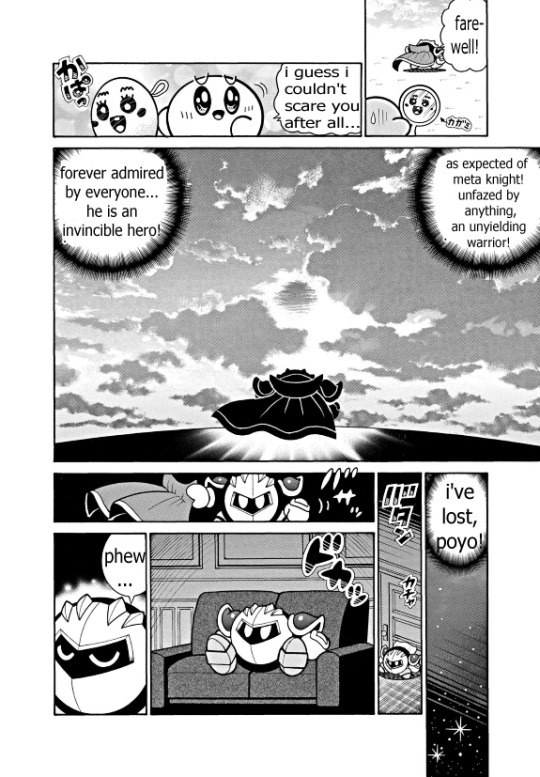

translated a new chapter of dedede de pupupu na monogatari (also known as kirby manga mania) by hirokazu hikawa! meta knight appearances are a rare treat in this manga, but i always absolutely love hikawa's take on him. a cool, popular DORK.
#text#meta knight#disclaimer: i am no professional at this i just do it for fun and knowledge. the power of neurodiversity compels me#i will say i don't really understand the variety show joke#i know バラエティ is/are basically japanese game shows but i don't know what balloons particularly have to do with it lol#also when mk says kirby's ghost trick scared him the most - he used the word 'obake' which is like a shapeshifting yokai (ghost/demon/etc)#which makes this the second time mk has expressed fear of ghosts in a kirby gag manga
267 notes
·
View notes
Text
Current manga[ish] reading list in no particular order
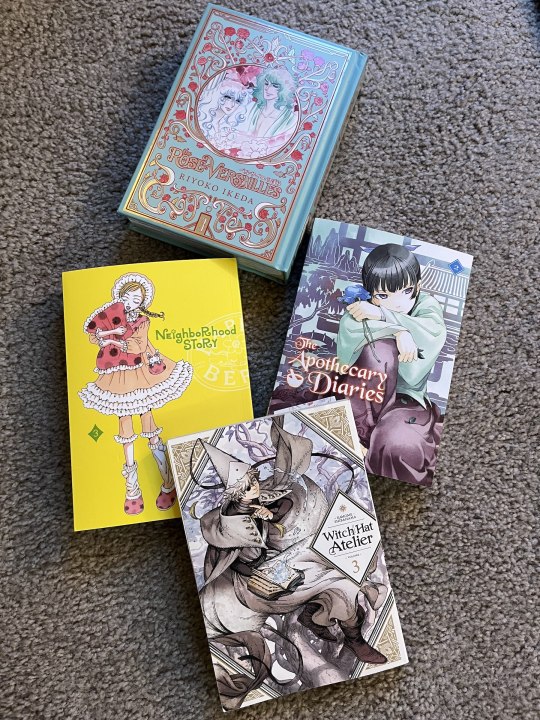
Neighborhood Story (Gokinjo Monogatari) by Ai Yawaza - I now own up to volume 3 of the English release of the manga. The four volume set is based on what I believe was the 10th Anniversary reprint of the manga in Japan. The French edition also follows the four book format but I think the German sticks to the original seven. I have the original tankobon editions for volumes 1-3 where when you line them up, it creates a long dinner table with the entire cast.
I read the entire manga in the early 2010s via scans and had spent the late 90s to that point praying for an official release after Paradise Kiss was printed by Tokyopop. The series was old enough that in the late 90s early 2000s no one was out there doing the line by line translations that I used to use to read manga. I read all of Wish that way with the original manga and the speech bubble guide. e.g. page 12 panel 5 Overall impressions - this was a white whale for me - I likely bought the original manga when I was sixteen or seventeen based on the art style alone. I would say it falls into your standard dramatic shoujo manga with high school students but the lives of ones in counter-culture, outside the norms of usual expectations. When I read the scans I enjoyed it and while it was nothing mind blowing it is a rewarding read. The various individuals sporting alternative fashions is one of my favorite aspects of it. You have a MC who leans mostly towards mod style (Twiggy from the 1960s) with a strong vintage twist, punk, lolita, generic 90s alternative dude, preppy and your designer brand girl.
I look forward to getting volume 4 and completing the set, just it will be likely 28 years later than I would have wanted. The Rose of Versailles by Riyoko Ikeda - I sprung hard for the recent English hardcover editions. One of my friends lent me her roommates 2 volume tankobon set of this series in 2000, but it too lacked a good translation to find online and read along to it. I watched the anime in 2014 and bought the DVD box set. Of course, I couldn't say no to this classic shoujo manga. I'm through the first three volumes and slowly working my way through it. Seeing that I already watched the anime, nothing in it is overall surprising.
I have noticed that early on the level of gay is pretty high and this current "twist" of Andre getting closer to Oscar is much stronger than I felt in the anime. The entire loss of Rosalie and her fawning over Oscar was a disappointment, also toned down in the anime. There is a lot more questioning with Oscar's character as to who she is, what she desires and how to fit into her world. I really wish it pressed those questions more but alas, I'm really starting to feel the Oscar x Andre pressure ramping up. In the anime I felt like it sort of came out of nowhere and in the manga it is more like - okay Rosalie's crush was cute but real adult relationships need a man. lols. Even with my different opinion on the manga compared to the anime, I cannot stress how owning such a fundamental manga series is. I don't think I'll ever attempt a meta on this - more than enough already exists about this with how long it has been around. Witch Hat Atelier by Kamome Shirahama - An impulse purchase at The Comic Swap on Allen Street. I'm pretty sure some of the individual volumes of X and other early 2000s manga were on the shelf when I was in university.
I'd heard some good murmurs about this manga and a friend kept recommending it. I can't explain how blown away I was this series. The art style is amazing with little use of screen tones and the emphasis on line art. With the author's previous work for DC and Marvel it shows but in all the good ways as far a composition and again that line art. And we haven't even gotten to the story itself! I have read through volume 3 and the pacing is excellent. It doesn't info dump how magic works and the world building is natural and unforced. It already has brought up great questions about who controls knowledge, disability vs accommodation, dealing with trauma, what is your purpose in life/goals. It has the right amount of whimsy that you feel cozy but at the same time you know when shit is serious.
What I feel the most is that Witch Hat Atelier is intentional with everything in it. It is a carefully constructed story and comes together naturally with a good balance of young pupils and adults. And the character designs! Oh my goodness, I love them all.
The Apothecary Diaries by Natsu Hyuuga - Can't skip my gal Mao Mao. I mean I cosplayed as her back in April because how frequently do you get a pragmatic female lead with deadpan humor and is a scientist who likes plants? I also watched the first season of the anime loving every moment of it and how it really shines with its focus on women navigating a world not made to really benefit them. I decided to read the original light novel instead of the manga based on the light novel. I think by time I finish volume 2 I will have caught up to season 1 and hopefully, pull ahead of the eventual second season which comes in 2025, I think.
Out of all the titles, this one is likely my biggest guilty pleasure as a plant biologist; Mao Mao as a character has a lot of common scientist traits which make her very relatable and fun to see in any sort of media. Her obliviousness to certain things not because she doesn't have an eye for details but because she can't be bothered is realistic but rarely given to a female character in most forms of media regardless of cultural context.
Will I dive into the rest of these series for a meta? I'm honestly not sure. I may do a "quick" review of Gokinjo Monogatari when I complete volume 4 but it isn't the sort of manga that feeds into deep critical analysis. It is a coming of age story about artistic kids and looks cool.
I'd likely be more inclined to tackle Witch Hat Atelier but sometimes I just want to read something and not deep dive into it even if it intellectually feeds my curiosity. My current plan is to catch up on the manga and I'm relying on my county library to read volumes 4-13. If I really like it, I'll probably become a sucker and buy it at some point but I need to be a little more mindful of my manga purchases for the sake of my overflowing bookshelves. I took one of those surveys about how much manga you own and I wasn't expecting to clock in at almost 200 volumes when I've given away/sold/donated them from time to time.
I've got some thoughts on Kekkai Sensen but I'm waiting for the next chapter to drop since it ended on a cliff hanger with that plot twist where the "Count" from previous statements in the manga was not some old frumpy classic Dracula like Blood Breed but instead in a teenage form as Edgar. I liked the twist since I was suspicious of his character but didn't think he might have been the true mastermind of things. But we'd be lazy readers if we'd forgotten that Blood Breeds can easily shapeshift as demonstrated with Girika and Tonio. I will always give her ultimate cougar cred testing out her boy toy before committing to making him a Blood Breed instead of snacking on him.
#gokinjo monogatari#neighborhood story#rose of versailles#the apothecary diaries#witch hat atelier#manga recommendation#currently reading
16 notes
·
View notes
Text
So like, one thing we really love is intertextuality. Meta-reference between two texts to create more meaning.
And anyway, in Suruga Monkey, we get this comment about the original Monkey's Paw - her "second wish", what she wanted to try after checking it worked, was wishing for her parents to come back.

Now, two things are important here.
One, the Monkey's Paw in Monogatari doesn't work like the old Jacobs story. She's just clinging to the popular story to ease her sense of guilt for what happened with her first wish.
Two, the idea of reviving the dead actually comes up in the original story! The married couple who use it, wish for money and are shocked to discover they receive it as a compensatory fund after their son dies in a workplace accident.
Despite the clear established rule of "it grants wishes, but not as you think", the wife insists that they bring their son back - for their second wish.
Late at night, there's a knock at the door, and the husband - wholly perturbed and against doing this from the start, worried they'll bring back a living corpse instead of their son - makes his third and final wish.
The knocking stops. There's nobody at the door. We never find out what awful state the body was brought back in. Even the story that Kanbaru clings to for closure, can't give her closure.
67 notes
·
View notes
Text
(I know this is an old post but I've had Japanese SFF on the brain lately and wanted to see if anyone on Tumblr was discussing this series; I hope you're still interested!)
Katō's appearance is ambivalent because Katō in general is ambivalent, and Katō in general is ambivalent in part for ideological and even moral reasons. The politics of Teito monogatari are reactionary to a point that even many readers in a notoriously conservative space like Japanese SFF fandom take serious issue with (Aramata is, or at least was when he wrote it, so right-wing that the danger of Mishima going woke is a serious plot point!), and this is relevant to how we are to understand Katō because he's the incarnation of grudges held by people groups that were victimized by the Japanese state formation process in the distant past. And yet people have to do something with Teito monogatari because it, quite frankly, rules. If you have basically any political leanings on the planet other than "very, very, very right-wing Japanese person," the natural way to resolve this is to make Katō more of an antiheroic figure, more like what Black Panther was trying to do with Killmonger and might have done more successfully if the MCU weren't the way it is. So you get Katōs who act different and thus look different, plus the common issue of the first live-action Katō, Shimada Kyūsaku, affecting the look and feel of all subsequent portrayals.
whats up with yasunori kato anyways?
some depictions he’s vaguely hot, but in like, a tumblr villainfucker way
some depictions he looks like someone tried to draw yukio mishima with their left hand
and some depictions he’s just a creepy old guy
10 notes
·
View notes
Text
Summer 2024 Anime Round-Up
Supposed to come out last week but MHA and Monogatari decided to be weird and bleed over into next season (Not waiting for your final episode Monogatari)
Anime of the Season: "Oshi no Ko" Season 2
Best Opening: Tsuyogaru Girl (Makeine)
Best Ending: Burning ("Oshi no Ko" Season 2) & Kamakura STYLE (The Elusive Samurai)
Drops: Atri -My Dear Moments- & Alya Sometimes Hides Her Feelings in Russian
Plans to Watch at a later date: N/A
Completed:
Shoushimin Series - (9/10)
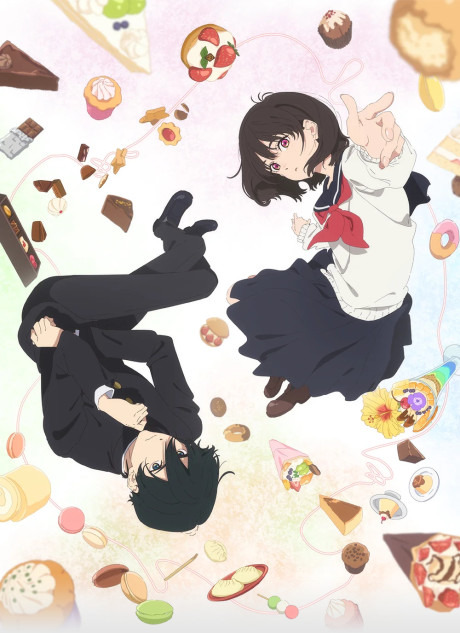
As it turned out the creator of Hyouka wasn't a "one hit wonder". (Though I don't know if they have other works outside of these two). Absolutely fantastic character study that can balanced being thoughtful, suspenseful and completely unhinged. I can't wait for S2 where we'll -hopefully- see Osanai finally punch someone.
Psuedo Harem - (7/10)
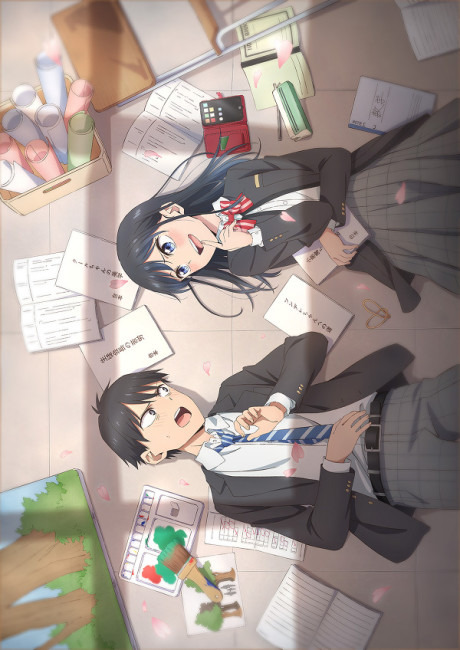
A anime with 'Harem' in the title that isn't trashy and is acutally...good? In today's society?
Been a while since I've seen a romcom this cute. Warning to any Saori Hayami fan watching this though. You definitely will fall in love with her more by watching this.
The Magical Girl and the Evil Lieutenant Used to Be Archenemies - (9/10)
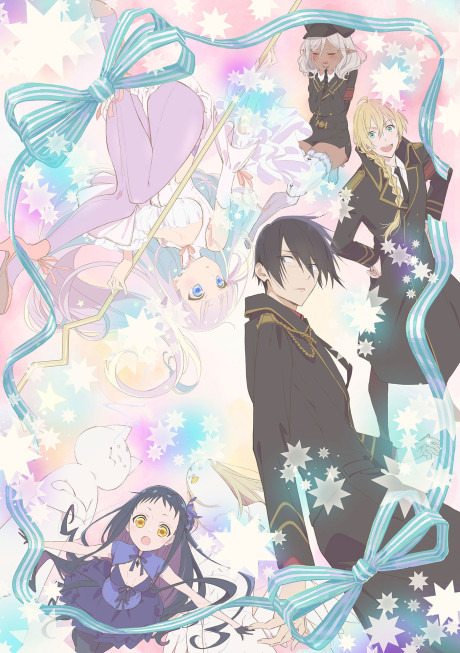
The circumstances surrounding this manga are tragic but that didn't take away from this being an very well produced shoujo series. Bones definitely sought out to honor the late mangaka with this production and it paid off in the direction and cinematography. Also, as I grow older, I can't help but appreciate 12 minute anime episodes; as rare as they are.
Makeine: Too Many Losing Heroines! - (8.5/10)
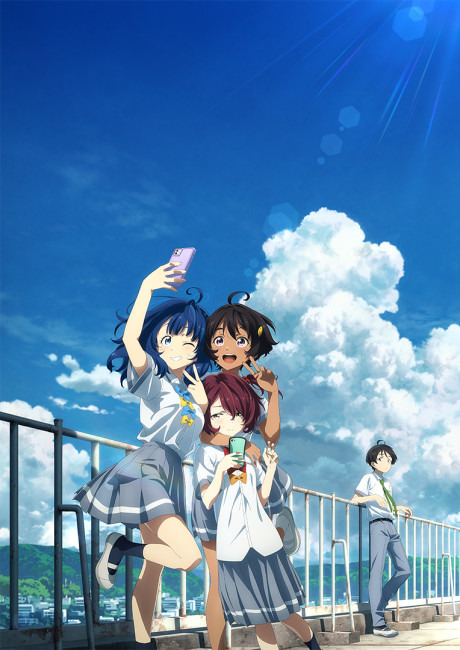
The show I was most looking forward to every week. I don't think this writing was as smart as I thought it was, and lord knows I'm tired of light novels trying to be as meta as possible. But this show had a lot of heart and was very well directed for the director's (Shoutarou Kitamura) debut. Really hoping we get more of this someday.
Yatagarasu - (9/10)
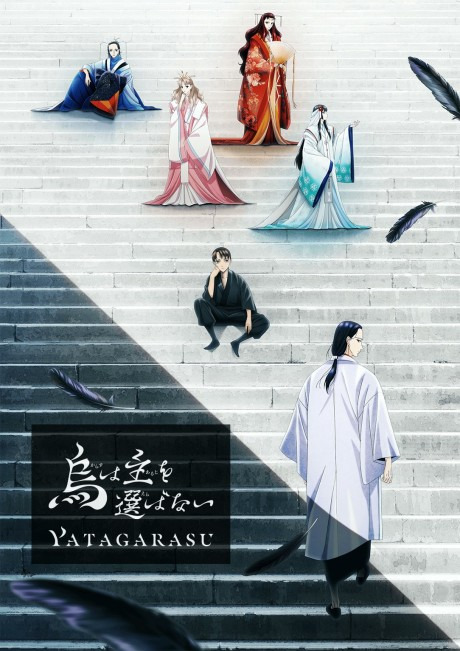
My dark house of anime this cour. And maybe all year. This was one of my "Check it out cause it's getting good word of mouth" shows, and was instantly captivated. The world-building and character drama is so intense that every episode was exciting. My only critique would be how stiff the animation looked but from what I've gathered, this show was working with a rather small team at Pierrot. Please watch this show.
The Elusive Samurai - (6/10)
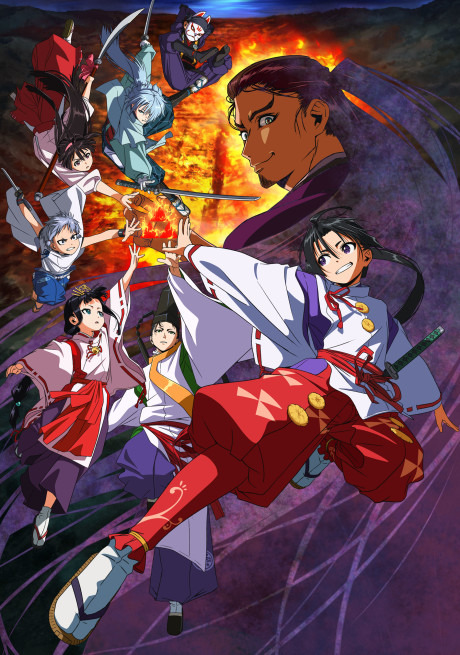
I really wanted to like this show more than I did. I was a huge fan of AssClass and a work from Cloverworks with Umehara as AniP? Sounds like a recipe for success. Unfortunately, this show didn't know what genre it wanted to be and it hampered my enjoyment quite a bit.
NieR:Automata Ver1.1a (Cour 2) - (8/10)
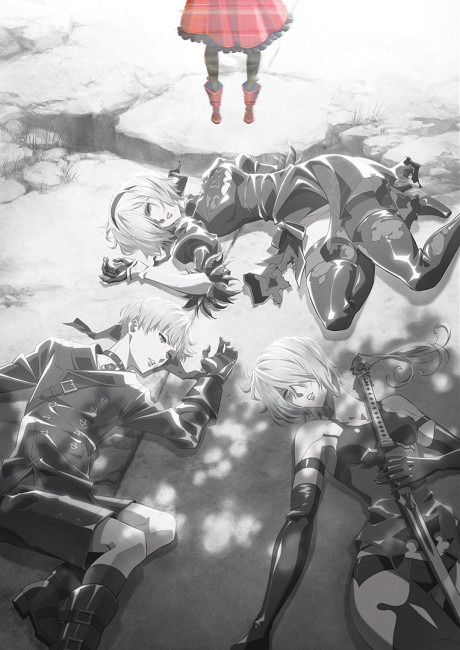
A2 >>>>>>>>>>>>>>>>>>
(also I need to keep playing the game cause wtf was that final episode)
Wistoria: Wand and Sword - (7/10)
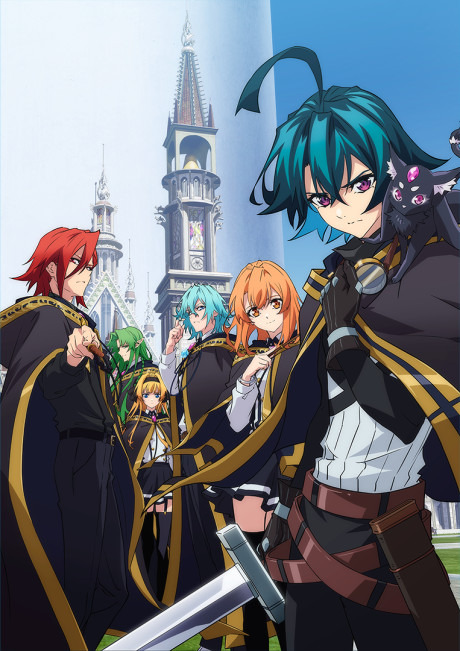
You can take the Black Clover out of Yoshihara but you can't the Yoshihara ou- uhhh.
Honestly I'm not sure how to write my feelings on this show outside of "Danmachi/Black Clover" love child. We will be there for S2
"Oshi No Ko" Season 2 - (10/10)
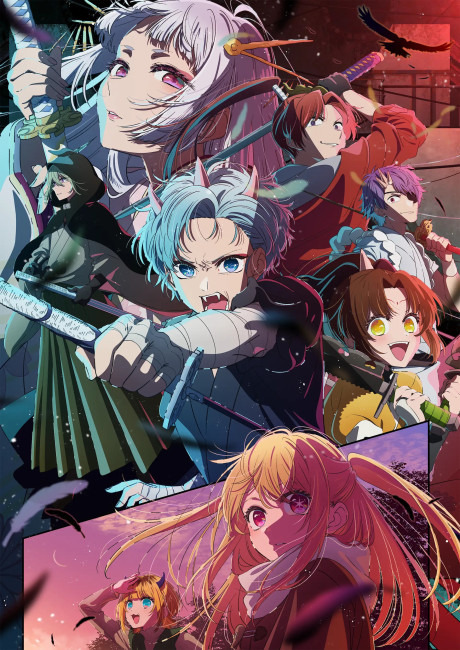
They told me Tokyo Blade arc was a peak fiction...At this point, my only fear is that OnK can only go downward from here.
Also everyone in this show needs therapy (though if you've seen one episode of this, you probably knew that already.)
Mission: Yozakura Family - (7/10)
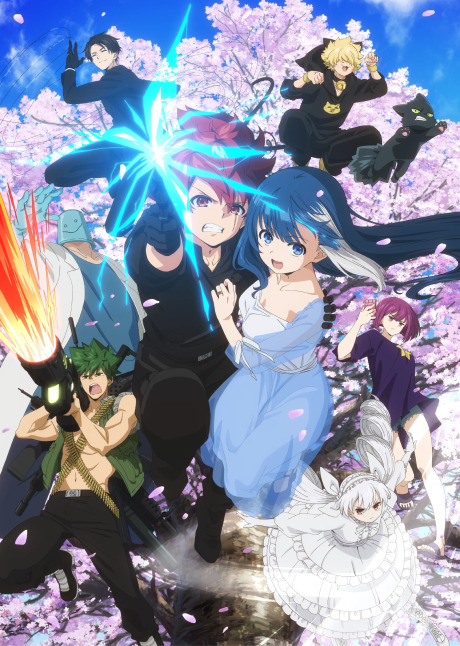
Damn you Disney+!!! How many more shows must be put in your jail and remain hidden from the world. This show reminds me a lot of Hitman Reborn which maybe is why I stuck around to watch it till the end. It did get kind of dumb once they explained the powers but still very enjoyable.
Also shoutout to the ED "Kekkon Koushinkyoku" for being a really really cute ending that didn't make my favorite ED of the season, but still felt it worth mentioning.
My Hero Academia Season 7 - (8.5/10)
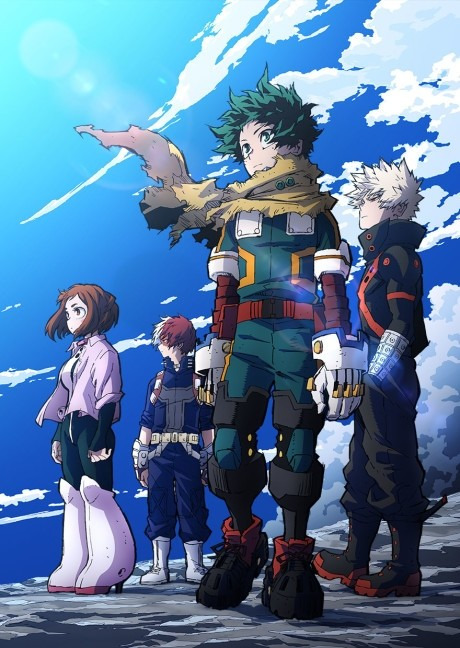
Usually when a show gets a new director it get's a decline in quality with the size of that decline varying from show to show. But sometimes, you get a new director that just knows what she's doing and takes MHA to some of it's best seasonal run since Season fucking Three back in 2018!!!!!
*cough* what I'm trying to say is "MHA IS FUCKING BACK"
Monogatari Series: Off & Monster Season - (8/10)
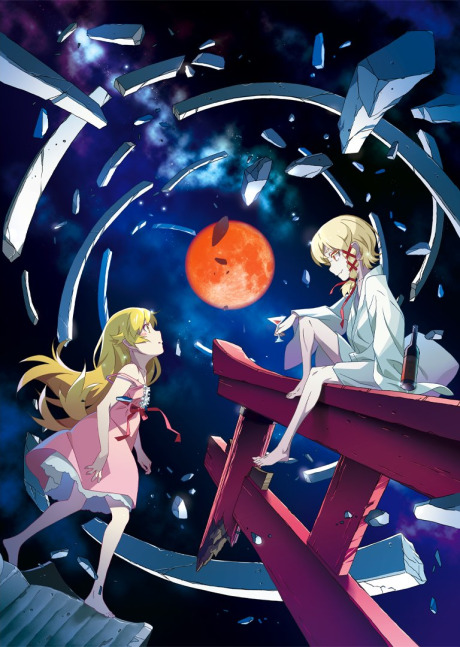
Fuck you monogatari for not finishing in time and delaying my round up. uhh anyway Monogatari is back and still as peak as ever. Nadeko and Shinobu are high up in my "best monogatari girls" tier list (Shinobu is actually no.1) so it was a treat to see them get focus again. Nadeko's arc high the hardest for me in what it means to confront and move on from you past. Just great writing once again. Can't add more than what I've been saying since Bake.
#anime round up#summer 2024#shoushimin series#pseudo harem#mahoaku#makeine#yatagarasu#the elusive samurai#nier anime#wistoria#oshi no ko#mission yozakura family#my hero academia#monogatari series
9 notes
·
View notes
Text
In 2027 Nadeko’s heroine book will become required monogatari reading due to art related meta jokes
4 notes
·
View notes
Text
It's really interesting how characters view others in monogatari. I've been rereading some of Owari 3, and one thing that stuck out to me was how Tsukihi and Nadeko compare Koyomi and Karen (and Nadeko herself), calling them driven people with serious goals, in contrast to Tsukihi's more aimless approach to life.

However, this contrasts with our many books narrated by Koyomi - I would not at all call him a particularly goal-oriented person. Unlike Karen, who is driven by justice, Koyomi is much more reactive - he doesn't go out hunting for wrongs to right, but does intervene when things appear in front of him, as they do in several of the stories. His more driven moments come more from having hard lines that he won't let be crossed - not wanting to be responsible for people's deaths, at the end of Kizu; not wanting his loved ones hurt, in Nise 2; and several other instances in the series. Dedicated, maybe, but clearly different from someone actively striving living for their own goals like Karen.

In contrast, when Ougi compares Tsukihi and Koyomi, she thinks their key difference is not their goals, but their self-criticism - where Koyomi's awareness of himself spills over into suicidal self-loathing, Tsukihi lives more freely, not worrying about accidents or potential consequences that may result from her good intentions.
Personally, my read of their characters is that this is closer to correct than Nadeko and Tsukihi's interpretation above, but I could be wrong. And it's noteworthy that Ougi, whose role is to act as critic, is the one making this observation - of course, to her, how much a person is willing to despise their own flaws is going to be one of the first places her mind goes to compare - she isn't unbiased either!
6 notes
·
View notes
Text
speaking of meta and analysis, here's a piece i did about genre theory and Monogatari, and how it's really hard to nail down Monogatari as being a single genre
23 notes
·
View notes
Note
What if koyomi was a girl or the whole series was genderbent?
well if just koyomi was genderbent, the series would be a little gayer, which would be cool. it's already pretty gay though so hard to get that much gayer. i guess nadeko would actually fall in love with her for real for real and not just comp het it. so that entire plot with her could potentially just not happen. although it still could! kanbaru might also become a love interest. or she could see the girl she loves date a girl and see like "oh so it's not her sexuality she just doesn't want to date me" and idk how that would affect her but yea. im just assuming off the bat that senjou would still date koyomi. shes pretty bisexual anyway or on a meta level, koyomi becomes a hashtag tumblr failgirl gay icon and monogatari gets super popular here. which is either in the dark or light timeline depending on your view of that also, there's less fanfiction written for it because people don't make yuri fanfiction. fucked up
but if everyone was genderbent, it would become a reverse harem (not that im saying monogatari is a harem show), which would probably change and inform a few things with how the story handles itself. not too much though i think it'd still mostly be the same. i think it would definitely not be as popular though. maybe even considered kind of niche.
12 notes
·
View notes
Text
In case you wanted an indication of how fucking stacked the rom-com meta is this season, we are in a situation where a new show from the Takagi-san director, a new show from the Ore Monogatari director, and fucking Skip and Loafer are all losing out on the top spot because Lidenfilms decided to do justice to one of the rare manga I’ve actually read before it was turned into an anime.
Watch Insomniacs After School, I am begging you.
12 notes
·
View notes
Text
You absolutely could reveal the existence of oddities to Tsukihi, is the thing.
The Shide no Tori prevents her from learning about her true nature in the same way that being a ghost prevents Hachikuji from ever finding her mother's house.
Oddities don't have hard rules, the world of Monogatari works more on a theme of balances.
If you want to solve a problem, you absolutely can find Some Bullshit that lets you do so, like Meme does at the end of Kizumonogatari.
You just have to redistribute the problem. An issue would pop up somewhere else. Kagenui's line about how an immortal oddity could only enact false justice comes to mind.
It's absolutely possible to change Tsukihi, I think. It's just that on the meta level, her role in the narrative has prevented that.
The Fire Sisters are there to do slapstick comedy and serve as a contrast to Koyomi with the relative 'purity' of their intentions. There's really not much need to have them grow up so long as he remains the protagonist. Their involvement in events remains passive and incidental.
I think the only reason Tsukihi hasn't changed much is because nobody really wants her to.
5 notes
·
View notes
Text
aretaix anecdotes
eudiel or eudae. 21+ . ey/em
interests: puyo puyo and madou monogatari, proseka, enstars, umineko, original fiction (with OCs), femslash/yuri, supernatural/human, queer fic in general
This blog serves as a mirror for my AO3 and and SQwA.
I block people who write incest, pedo, bestiality, etc. I do not want to interact with self-ascribed "proshippers".
CW: I write about suicide frequently, as well as death and mortality in general. My work is mostly SFW with some dark elements. I write about disability sometimes and dissociation (I am multiple). Please let me know if any of my work depicting physical disability is harmful in any way.
All my posts are fine to reblog.

art blog . ao3 . sqwa
special thanks to cafekitsune and firefly-graphics for all images used on this blog!
tags:
I generally tag everything by fandom and character.
#one shot: Any one chapter fic greater than 1k words
#multi: Multi chapter fics. I recommend using the /chrono filter on desktop Tumblr.
#snippets: A catchall tag for ideas/work in progress/draft stuff
#hc: Headcanon compilation posts. Tagged by character.
#meta: Analysis stuff tagged by fandom/relevant character.
current projects:
Don't Go Where I Can't Follow - Lala/Arle slashfic.
guiding light - in the process of writing. fic about rozatte (puyo puyo) and arktos' (fan character's) first meeting as children.
the cry of a falling star - outlined, not written. a fic exploring a divergent canon following kaname tojou's injury at reimei academy. instead of a coma, he has suffered a severe traumatic brain injury resulting in loss of motor coordination and hemispatial neglect. it explores kaname's relationship with his half brother, the way he copes with being unable to pursue his dreams, and the change of personality resulting from his injury.
5 notes
·
View notes